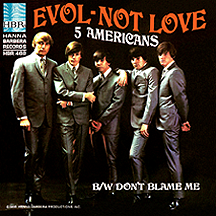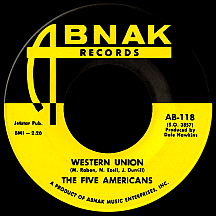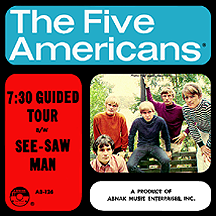THE FIVE AMERICANS
Western Union
A Dallas beer joint called Pirates Nook was the jumping-off point for one of its featured bands, The Mutineers - not off the plank and into the chilly waters below, mind you, but more in the pass-the-baton tradition of hijacking the music business (within the borders of the great state of Texas, anyway) and calling the shots for a few weeks. "I See the Light" was the rocking two minutes and ten seconds of guitars, organ and assertive vocals that prevailed over Lone Star radio playlists during the final umpteen weeks of 1965 (number one in a few cities and top ten in the rest) as it branched out into early '66 and achieved an overall position in the top 30 of the remaining, and more competitive, 49 states. Leader Mike Rabon had imagined such a breakthrough when he first strummed a guitar at age eight and again as he inched closer with a high school group called The Rhythm Rebels. Attending Southeastern Oklahoma State University in the city of Durant in 1962, he began assembling his band of figurative plunderers who would one day be known by a very patriotic-sounding name.
Southeastern student John Durrill joined Rabon's band as keyboard player and guitarist Norman Ezell came on board to complete the group's core trio; bassist Jim Grant and drummer Johnny Coble covered the back end. They played mostly college events in 1963 and early '64 and before long Coble was replaced by drummer Jimmy Wright and the Mutineers headed to Dallas, where the Pirates Nook stint raised the interest of John Abdnor, an insurance man who'd founded a record label, Abnak, primarily as an outlet for his son John, Jr. (who later had a few chart singles with Javonne Braga as Jon and Robin). The band was signed to the company's Jetstar label after Abdnor convinced them to adopt the name The Five Americans in order to leave no doubt as to their country of origin amid 1964's dominance of British bands.
"It's You I Love," "I'm Gonna Leave Ya" and "I'm Feeling O.K." combined for a raw, pounding one-two-three punch, all penned by Norman, Mike and John, as were most subsequent efforts which, early on, were made in a small studio in the West Texas city of Tyler. '50s rock star Dale Hawkins (originator of the often-imitated and/or remade classic "Susie-Q") was hired as an A&R man for the label and produced the majority of Five Americans recordings. In an effort to reach an audience outside the local area, the summer '65 single "Love, Love, Love" (a Mack David-Teddy McRae-Sid Wyche song that went top 40 for both The Clovers and The Diamonds in 1956) was unceremoniously leased to ABC-Paramount. It took just one more try for the strategy to hit pay dirt.
Abdnor cut a deal to have "I See the Light" issued on HBR (a new label run by cartoon kingpins Bill Hanna and Joe Barbera) and it swept through the southwest in the fall of '65, creating immediate demand for the act in higher-profile live venues and on TV dance shows. "Evol - Not Love," an exercise in reverse psychology (lyrics and title) peaked mid-chart in the spring of '66; Durrill's Vox organ work, perhaps more than any other element, set them smack dab at the forefront of the growing garage band movement. A third HBR single, the more psychedelic "Good Times," didn't catch on, after which the band 's releases reverted to Abdnor, who moved them from Jetstar to the Abnak label. With "Reality" the guys dabbled in a multi-hued kind of psych-rock, perhaps a bit ahead of the national curve. After the ultra-poppish "If I Could," Mike, Norm and John brainstormed an idea that resulted in their biggest hit.
Spotting a Western Union telegraph office during their travels, a song began to take shape about a guy receiving a "Dear John" letter from his girlfriend via telegram ('Got your cable just today...killed my groove, I've got to say...'). The catchy 'Dit-di-dit-di-dit' of 'Western Union" (imitating the "tap-tap-tap" of a telegraph machine) was the hook listeners hummed and helped drive the springtime single into the top ten. It wasn't particularly obvious, but the Rabon-Ezell-Durrill songwriting trio ranked among the industry's more consistent hitmakers of '66 and '67. "Sound of Love," with a more prominent organ line than usual, hit the top 40 in June and the inevitable pattern set in of recycling the concept of the biggest hit, in this case technology/communications-based rhymes (Abdnor pressured them to go in that direction in a not-so-subliminal attempt to sell more records). "Zip Code," the U.S. Postal Service equivalent of "Western Union" (with a 'Zip-zip-zip-zip' instead of 'dit'), got them back into the top 40 that fall. A little "theater of the mind" was served up with "7:30 Guided Tour," while early '68's "No Communication" overplayed the gimmickry.
John Durrill quit the band and joined The Ventures in 1969 (he later composed songs for Cher, including her chart-topping 1974 hit "Dark Lady"). Ezell left the music biz altogether at about the same time and the band was billed as Michael Rabon and the Five Americans on the singles "Virginia Girl" and an unnecessarily reworked "I See the Light-'69." New members Lenny Goldsmith and Bobby Rambo didn't stay long, mainly because the act split up the following year. Rabon and Jimmy Wright formed a new group, Michael Rabon and Choctaw, for a couple of light, country-rocking singles on Uni. Then Rabon was a member of Gladstone, a Tyler, Texas quartet that hit with "A Piece of Paper" on ABC Records in 1972. Jim Grant (who'd designed the covers of The Five Americans' HBR and Abnak albums) just might have been the biggest moneymaker of the bunch; for many years he headed a lucrative graphic design company in Dallas.




